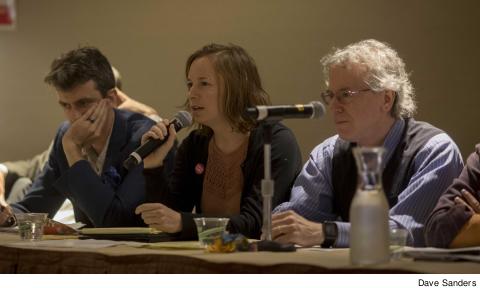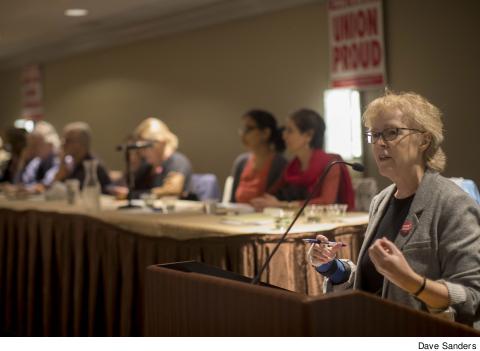Recognizing work done outside the classroom
 |
The most newsworthy gains in the new contract, ratified in November, are the salary gains for adjunct faculty, whose pay will significantly increase over the life of the agreement. One of the main goals of the bargaining team in this two-year contract struggle was to gain pay for the work adjuncts performed outside the classroom. It was a long and arduous fight, but ultimately the union won something quite significant in addition to the general salary hikes for part-time instructors: a paid office hour every week for every three-credit course.
A BIG WIN
President Barbara Bowen said, in an email to members, that “paying adjuncts for more of the hours they actually work is a progressive provision and a centerpiece of the new contract” and that the “provision for paid office hours means that adjuncts are paid for substantially more of the hours they work; it recognizes the professionalism of adjunct faculty; and it guarantees and expands students’ access to their instructors outside of class.”
Chancellor Félix Matos Rodríguez, when he announced in October that the proposed agreement included the paid adjunct office hour, said, “all of our faculty will now devote more time to meeting with and advising students” and that “[t]his will be crucial to our efforts to increase graduation rates, enhance learning and remain a premier university.”
RECOGNIZING WORK
For Meg Feeley, an adjunct lecturer at Kingsborough Community College and an executive council member who served on the PSC bargaining team, the paid office hour constitutes a formal and compensated recognition by the administration of the hard work adjuncts have always done outside of in-class teaching hours.
“Historically, teaching adjuncts have made 40 percent more per hour than non-teaching adjuncts, and that was supposed to reflect the fact that teaching adjuncts must perform work outside the classroom,” she told Clarion. “But that 40 percent only begins to pay for the time teaching adjuncts spend meeting with students, prepping and grading. The bargaining team, informed by early meetings among adjunct activists about this ‘ghost workload,’ saw this as the opportunity to stretch the city and state ‘pattern’ of 2 percent a year – barely enough to keep pace with inflation– to bring more pay to teaching adjuncts. Besides getting paid now for one hour per course three, four or five credits per week, teaching adjuncts are – for the first time – being paid specifically for the time we work outside the classroom. That’s one of the historic things about this contract.”
PENSION BOOST
She added that beyond putting more money into adjuncts’ pockets, the provision will also help part-time instructors in terms of their pensions. “We are now to be credited with hours that will make us eligible sooner for a full year of service in [The Teachers, Retirement System],” Feeley said.
As members debated and discussed the terms of the MOA, some adjuncts were concerned that the requirement of a paid office would mean an increase in workload, or, at the very least, provide a way for the administration to manage the time of adjuncts outside of class. But, as Feeley maintained, the office hour is work many adjuncts have already been doing.
“Some are concerned that this is a form of ‘workload creep,’” Feeley said. “No one is arguing for a longer work week. The fact is, we adjuncts are hourly employees, not salaried.”
And as Luke Elliott-Negri, the PSC chair at the Graduate Center, wrote in Gotham Gazette: “Adjunct faculty at CUNY are as dedicated as any to the students they teach. They have long held office hours and met with students as much as those students need, but mostly without compensation. This new hour of pay for every course begins to recognize the many hundreds of thousands of hours of uncompensated labor that CUNY adjuncts perform every semester.”
In an email to members at her home campus of Baruch College, Carly Smith, the union’s vice president for part-time personnel and a member of the bargaining team, said, “I have heard some concerns from members about potentially unfair, unreasonable monitoring of these hours and the possibility of adjuncts being coerced into performing additional uncompensated labor… During negotiations, we on the bargaining team advocated for the strongest possible language to guard against any new avenues of exploitation. I pressed on this issue, as an adjunct myself.”
FORMALIZING PRACTICES
Smith continued, “While I do think this provision will be complicated to implement, we should recognize that we have power in the union’s fundamental position: The additional paid office hours should be formalized according to the existing, typical practices of a department, according to the same requirements as full-timers. Also note that the language of the agreement doesn’t specify that the office hours must be spent literally sitting in a department office, but rather ‘on campus’ and ‘available’ to students. We adjuncts are already doing this work and will now be getting paid for more of it. And yes, we absolutely need to be ready to fight back against any administrative abuses of this provision.”
STUDENTS WIN
Anthony Gronowicz, an adjunct lecturer in political science and history at Borough of Manhattan Community College, was excited about the paid office hours. “Teaching two three-hour courses at one college and one course at another in the CUNY system, one can get three additional office hours a week, the equivalent of another course,” he explained. “And it benefits our students, who, after all, are the people we serve.”
Department chairs are preparing for implementation of this new arrangement.
“From my perspective it’s making progress toward paying adjuncts for the work they already do when they respond to student emails, prep for their courses and grade,” said Karen Weingarten, the interim chair of the English department at Queens College. “We’ve never policed how adjuncts use their office hours in our department, and we’re not planning to start doing so. We’ve also been fortunate in our department to be able to give adjuncts office space – no more than three adjuncts share one office, and we try to keep it to two when possible.”
Union leaders and staff are already planning for implementation of this major new provision. They are working to identify creative, cooperative ways to open up office space for adjuncts, and have prepared to ensure that the office hours are implemented correctly.
 |
Bowen firmly stated that the union would not allow the university to misuse this provision, stating that “the adjunct office hours may not be used for any purpose other than meeting with or being available to meet with students” and that if the “union learns of any attempts by colleges to repurpose or take over these hours, we will immediately challenge the college and, if necessary, file a grievance. CUNY management, the city and the state agreed to pay for these hours on the basis that they are to be used to meet with students; the union is determined to protect that purpose.”
LOOKING AHEAD
“With every new gain and new contract provision, inevitably we will face new challenges,” said Carol Rial, an adjunct grievance counselor. “How adjunct office hours will be managed will vary campus by campus and department by department. We don’t know specifically what to expect, but we are ready to face whatever calls and concerns adjuncts may have about the implementation of this provision in the future.”

